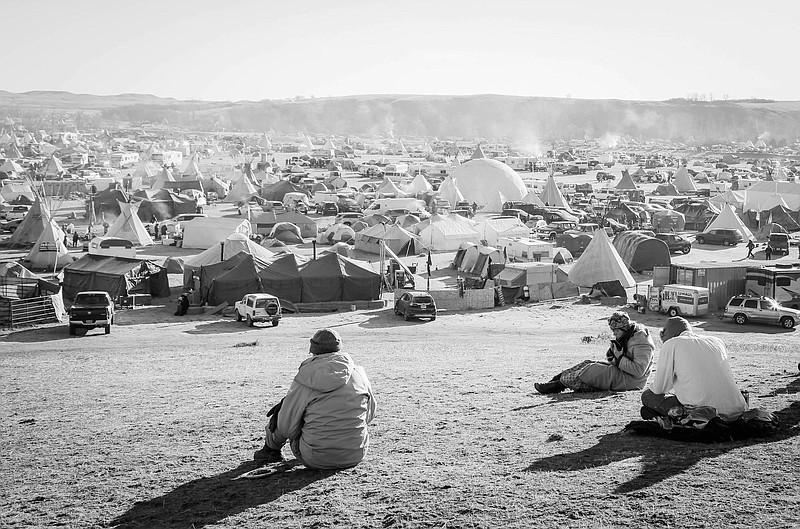For the first time in my 29 years, I didn't celebrate a traditional Thanksgiving. I avoided arguments about football, the election and topsy-turvy family dynamics. At 4 a.m. on Thanksgiving morning, my girlfriend and I packed our car full of warm clothes and SpaghettiOs and began the 22-hour drive to Standing Rock, N.D.
Being present with the Sioux tribe in North Dakota had been on my heart for several months, but the logistics of the trip itself seemed so daunting- not to mention the emotional plunge. I was fearful of the ramifications, regarding both my heartache over the situation and my general safety in going. Perfectly peaceful Water Protectors were being assaulted and arrested. What if that happened to me? How humbled I grew to learn that this issue wasn't about me at all. The focus wasn't on my contribution, my presence, or even my money. It just wasn't. Being in communion with the Standing Rock camp was to accept that my time there was indigenous-led and indigenous-centered.
After an exhausting drive, we pulled into Oceti Sakowin, the largest campsite of the Dakota Access Pipeline protests. I use the term "protest" loosely because that type of demonstration sometimes indicates violence. This project was anything but violent, and this was a mantra that was heralded throughout the camp. Prayerful protection was the theme, no matter how unjust the persecution became. Before the Water Protectors walked to the line to face militarized police, they girded themselves with prayers and sage smoke at the sacred fire that was located in the center of camp. Both their humanity and their resources were at stake, but they stood resolute.
And that's just it. That scene of indigenous people holding the line of their dignity is why I grew, simultaneously, so ashamed and so driven. Why is this happening in the United States? I asked myself. I felt the burden of a colonial background weighing on my heart and became aware of the privileges which allowed me to leave this place and return to a home free of uncivil encroachment. Grasping for answers, we attended a camp meeting to discuss racial relations and the concept of decolonization. It was the first time I had experienced a community-wide discussion on race, and it was overwhelming. As I heard the calm statements of both the indigenous and the people of color in the room, I began to recognize my role as a fledging participant in this arena of conversation. My role in Standing Rock, first and foremost (perhaps at most,) was to listen. This space wasn't about any ideas I had to offer. It was about what I could glean and take back to my own community. Even then, the responsibility of educating white people on their privilege was not the job of those indigenous- it was mine. The horrors of colonization were mine to dismantle. I learned that the first step in acknowledging decolonization as more than a concept was to return home and research whose land I now occupy.
How unsettling it was to return to Chattanooga and learn about its history in promoting the erasure of its original inhabitants. The Chickamaugas, a Cherokee subgroup, lost most of their land as frontiersmen forced their way into the valley during the late 1700s. Ross's Landing served as a last and flickering revival of native culture, gaining popularity as a trading post and center for Native American education. Tragically, it also served as the launching point at which the tribes eventually suffered complete removal from the area. Though Ross's Landing in downtown Chattanooga offers a genuine, architectural homage to the Cherokees' expulsion on the Trail of Tears, it is only the first step in reconciling such an act of genocide. I'm still in that process of moving past mere acknowledgment, too. I want to rally alongside a community committed to the preservation of indigenous heritage and recompense for its loss. But decolonization, in its truest form, is the actual dismantling of our ancestors' subjugation- giving back to a people we suppressed.
The plight of those indigenous is mostly environmental, but our carelessness turns a scene like Standing Rock into a major violation of civil liberties. Groups like Energy Transfer Partners who are poised to drill, defying penalty and federal order, are enemies to human rights. People like Tomi Lahren, who use their media popularity to spew hatred, promoting intolerance and skewed facts, are enemies to human rights. But before we begin feeling too righteous, reassuring ourselves that we do not fall into these categories, let us not forget that negligence, denial, and remaining uninformed on the issues of our fellow citizens of color is, in and of itself, a silent suppression of human rights.
Meredith Garrett, an avid writer and a personal trainer, recently moved to Chattanooga with her girlfriend and greyhound.

